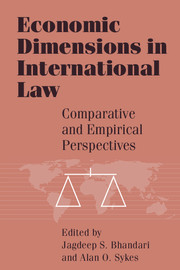Book contents
- Frontmatter
- Contents
- Preface
- Introduction: Economics and international law
- 1 The economics of the most favored nation clause
- 2 The economics of “injury” in antidumping and countervailing duty cases
- 3 The economics of “injury” in antidumping and countervailing duty cases: A reply to Professor Sykes
- 4 Innovations in support of the unitary injury test in U.S. unfair trade cases
- 5 The free trade–fair trade debate: Trade, labor, and the environment
- 6 International conflict and coordination in environmental policies
- 7 Market modernization of law: Economic development through decentralized law
- 8 Toward a positive theory of privatization: Lessons from Soviet-type economies
- 9 New stories on exchange rate policies in transition
- 10 Is deposit insurance inevitable? – lessons from Argentina
- 11 The market for migrants
- 12 The interplay of liquidation and reorganization in the bankruptcy systems of Canada and the United States: The role of screens, gatekeepers, and guillotines
- 13 International political economy approaches to international institutions
- 14 The trade effects of domestic antitrust enforcement
- 15 The Hartford Insurance Company case: Antitrust in the global economy – welfare effects and sovereignty
- 16 Recognition of foreign judgments as a trade law issue: The economics of private international law
- 17 Externalities and extraterritoriality: The law and economics of prescriptive jurisdiction
- Index
17 - Externalities and extraterritoriality: The law and economics of prescriptive jurisdiction
Published online by Cambridge University Press: 05 December 2011
- Frontmatter
- Contents
- Preface
- Introduction: Economics and international law
- 1 The economics of the most favored nation clause
- 2 The economics of “injury” in antidumping and countervailing duty cases
- 3 The economics of “injury” in antidumping and countervailing duty cases: A reply to Professor Sykes
- 4 Innovations in support of the unitary injury test in U.S. unfair trade cases
- 5 The free trade–fair trade debate: Trade, labor, and the environment
- 6 International conflict and coordination in environmental policies
- 7 Market modernization of law: Economic development through decentralized law
- 8 Toward a positive theory of privatization: Lessons from Soviet-type economies
- 9 New stories on exchange rate policies in transition
- 10 Is deposit insurance inevitable? – lessons from Argentina
- 11 The market for migrants
- 12 The interplay of liquidation and reorganization in the bankruptcy systems of Canada and the United States: The role of screens, gatekeepers, and guillotines
- 13 International political economy approaches to international institutions
- 14 The trade effects of domestic antitrust enforcement
- 15 The Hartford Insurance Company case: Antitrust in the global economy – welfare effects and sovereignty
- 16 Recognition of foreign judgments as a trade law issue: The economics of private international law
- 17 Externalities and extraterritoriality: The law and economics of prescriptive jurisdiction
- Index
Summary
Introduction: The problem of prescriptive jurisdiction
The problem of delimitation, or allocation, of prescriptive jurisdiction, sometimes misleadingly known as the problem of extraterritoriality, has long mystified and attracted international economic law scholars and commentators, and frustrated diplomats and regulators. Under what circumstances should U.S. antitrust law, securities law, labor law, or environmental law, for example, apply to conduct, effects, or institutions that are wholly or partially locatable abroad? The problem results from the fact that each state, or jurisdiction, may have multiple relations with a particular activity, asset, or person. Thus, granted bases for jurisdiction that include nationality, territorial residence, territorial conduct, territorial effect, and perhaps other bases, it is possible for more than a single state or jurisdiction to seek to regulate a single activity, asset or person. This regulation may result in overlaps that increase costs of compliance or that contradict one another. It may also result in “underlaps” that make possible regulatory arbitrage, avoidance or evasion.
The rise of the regulatory state, and the rise of international trade and investment, have combined to make these issues arise more frequently, and with greater consequences, than in the past. In fact, the problem of prescriptive jurisdiction has more recently been linked explicitly to issues of trade and competitiveness, for example, where the United States threatens to apply its antitrust laws to activities in Japan or elsewhere that foreclose markets to U.S. firms.
- Type
- Chapter
- Information
- Economic Dimensions in International LawComparative and Empirical Perspectives, pp. 642 - 683Publisher: Cambridge University PressPrint publication year: 1998
- 6
- Cited by



